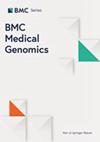Identification of autophagy-related genes as potential biomarkers correlated with immune infiltration in bipolar disorder: a bioinformatics analysis
IF 2.1
4区 医学
Q3 GENETICS & HEREDITY
引用次数: 0
Abstract
Bipolar disorder (BPD) is a kind of manic and depressive phase alternate episodes of serious mental illness, and it is correlated with well-documented cortical brain abnormalities. Emerging evidence supports that autophagy dysfunction in neuronal system contributes to pathophysiological changes in neurological disease. However, the role of autophagy in bipolar disorder has rarely been elucidated. This study aimed to identify the autophagy-related gene as a potential biomarker Correlated to immune infiltration in BPD. The microarray dataset GSE23848 and autophagy-related genes (ARGs) were downloaded. Differentially expressed genes (DEGs) between normal and BPD samples were screened using the R software. Machine learning algorithms were performed to screen the significant candidate biomarker from autophagy-related differentially expressed genes (ARDEGs). The correlation between the screened ARDEGs and infiltrating immune cells was explored through correlation analysis. In this study, the autophagy pathway was abundantly enriched and activated in BPD, as indicated by Pathway enrichment analysis. We identified 16 ARDEGs in BPD compared to the normal group. A signature of 4 ARDEGs (ERN1, ATG3, CTSB, and EIF2AK3) was screened. ROC analysis showed that the above genes have good diagnostic performance. In addition, immune correlation analysis considered that the above four genes significantly correlated with immune cells in BPD. Autophagy - immune cell axis mediates pathophysiological changes in BPD. Four important ARDEGs are prospective to be potential biomarkers associated with immune infiltration in BPD and helpful for the prediction or diagnosis of BPD.将自噬相关基因鉴定为与双相情感障碍免疫渗透相关的潜在生物标志物:生物信息学分析
躁郁症(Bipolar disorder,BPD)是一种躁狂期和抑郁期交替发作的严重精神疾病,它与有充分证据证明的大脑皮层异常相关。越来越多的证据表明,神经元系统的自噬功能障碍会导致神经系统疾病的病理生理变化。然而,自噬在躁郁症中的作用却很少被阐明。本研究旨在确定自噬相关基因作为与双相情感障碍免疫浸润相关的潜在生物标志物。研究人员下载了微阵列数据集 GSE23848 和自噬相关基因(ARGs)。使用 R 软件筛选正常样本和 BPD 样本之间的差异表达基因(DEGs)。使用机器学习算法从自噬相关差异表达基因(ARDEGs)中筛选出重要的候选生物标记物。通过相关性分析探讨了筛选出的 ARDEGs 与浸润免疫细胞之间的相关性。本研究通过途径富集分析发现,自噬途径在 BPD 中被大量富集和激活。与正常组相比,我们在 BPD 中发现了 16 个 ARDEGs。我们筛选出了 4 个 ARDEG 的特征基因(ERN1、ATG3、CTSB 和 EIF2AK3)。ROC 分析表明,上述基因具有良好的诊断性能。此外,免疫相关性分析认为,上述四个基因与 BPD 中的免疫细胞有明显相关性。自噬-免疫细胞轴介导了 BPD 的病理生理变化。四个重要的ARDEG有望成为与BPD免疫浸润相关的潜在生物标志物,并有助于BPD的预测或诊断。
本文章由计算机程序翻译,如有差异,请以英文原文为准。
求助全文
约1分钟内获得全文
求助全文
来源期刊

BMC Medical Genomics
医学-遗传学
CiteScore
3.90
自引率
0.00%
发文量
243
审稿时长
3.5 months
期刊介绍:
BMC Medical Genomics is an open access journal publishing original peer-reviewed research articles in all aspects of functional genomics, genome structure, genome-scale population genetics, epigenomics, proteomics, systems analysis, and pharmacogenomics in relation to human health and disease.
 求助内容:
求助内容: 应助结果提醒方式:
应助结果提醒方式:


